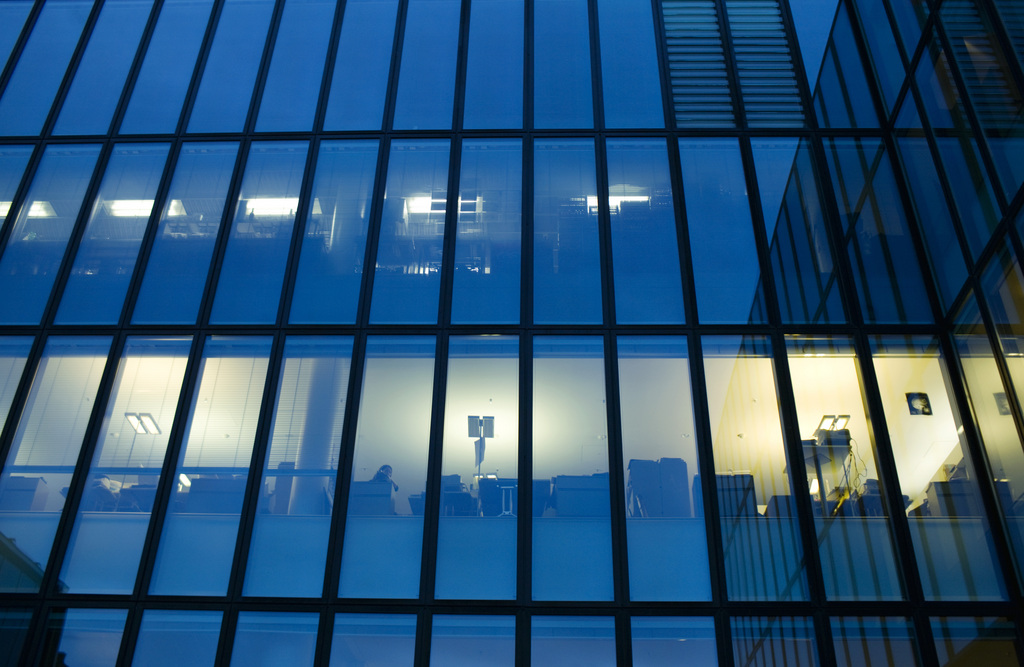
Swiss know-how helps fight Beijing smog

In January 2013 Beijing experienced the worst air pollution in its history – but while it clogged the lungs of many Chinese people, it helped open their eyes to the seriousness of the problem. And Swiss companies are jumping in to help.
“The government isn’t doing enough to reduce pollution. There is too much black smoke, too many exhaust fumes,” says Mr Ma, a Beijing pensioner who, along with his granddaughter, is taking advantage of a brief interval of clear sky to get some fresh air into his lungs.
“I have lung cancer, I can hardly breathe,” complains Mrs Li, another pensioner, who says she never goes out when the air is too polluted.
The Chinese capital was blanketed in smog for 25 days. The concentration of fine particles (PM 2.5 – i.e. those of a diameter smaller than 2.5 micrometres, small enough to get into the lungs) stood at nearly 1000 micrograms per cubic metre of air; the guidelines set by the World Health Organization (WHO) suggest a limit of 20.
Last year ordinary people were still playing down the impact of the smog. Today they are aware of the danger, mainly because the authorities and the media have been transparent about it, and put out warnings – which is a first.
Pure air from Swiss companies
The city authorities are promising clean air by 2030.
“That’s far too long!” says Zhou Rong, of Beijing Greenpeace. She points out that half the coal burned in the world every year is burned in China.
The cure is a long way off, so what is urgent now is prevention, and this is where Switzerland is playing a very visible role. The Swiss cross is all over the internet in China, most notably in advertisements containing the logo “IQAir”.
Business is flourishing for IQAir, a manufacturer of air purifiers based in canton St Gallen. These upmarket devices with their somewhat austere design enjoy a reputation for excellence. They are selling like hot cakes in Beijing.
“Sales have gone up by two and a half or three times since pollution peaked in January,” Mike Murphy, the head of IQAir China, told swissinfo.ch. Waiting lists are long, and the buyers are not just expatriates, but also – and more and more – Chinese.

More
Staying ahead of the clean technology curve
Breathe or leave
Despite the demand, Murphy is not allowing himself to get carried away. He admits that when the air is a bit clearer, sales will go back to their normal level, even if he has seen that many foreign businesses, and even some Chinese ones, are planning to move their staff out of Beijing.
Other Swiss companies in the air conditioning business are trying to enter the Chinese market, often using the good offices of Cleantech Switzerland – the platform established in 2010 by Business Network Switzerland, which supports Swiss companies interested in exporting their products.
Its latest success was the ground-breaking ceremony at the Sino-Swiss Zhenjiang Ecological Park, an environmentally-friendly industrial project, whose administrative buildings – 60,000 m2 – are being built by the Swiss company Keller Technologies.
Marco Rhyner, head of Cleantech Switzerland in China, has seen how much more importance has been attached to the environment in China’s last two Five Year Plans.
“It’s true that the pursuit of growth remains the prime objective,” he told swissinfo.ch. “But look at the air in Beijing: people are no longer willing to put up with the situation. I truly believe that the government has serious plans to improve things. Otherwise, anyone who can afford to do so will leave.”
At the height of the pollution in Beijing, hospitals experienced an upsurge of patients with respiratory problems.
The official press reported that 50% of admissions to the emergency wards of a large children’s hospital were for respiratory problems.
At article published by the China Daily in 2011 said the number of cases of lung cancer had gone up by 60% in Beijing in the previous ten years, while tobacco consumption had remained stable.
Beijing’s air pollution is caused mainly by the use of coal as fuel in the regional industries and power stations, as well as the ever increasing number of cars. (Source: AFP)
Words followed by deeds?
The Swiss Agency for Development and Cooperation (SDC) is putting CHF6 – 7 million ($6.3 – 7.4 million) into climate-related issues. That is 70 per cent of its annual budget for China. In particular it will work on amendments to Chinese legislation in order to strengthen measures to protect air quality. Philippe Zahner, head of the SDC section in China, has promised concrete results for this year, or next year at the latest.
Do the Chinese authorities really intend to tackle environmental problems, even at the risk of slowing down growth? Zahner is convinced that they do, given the transparency of the coverage of the Beijing smog.
“I believe that shows they have decided to take things in hand,” he told swissinfo.ch.
Sociologist Li Dun, a specialist in environmental issues at Tsinghua, one of China’s top universities, is less convinced. He thinks the authorities have more urgent priorities than the environment.
“There’s a lot of talk, but not much action. As long as freedom of expression remains a dead letter – even though it’s guaranteed by article 35 of the Constitution – ordinary people won’t be able to put enough pressure on the polluters and make the government tackle environmental problems.”
(Translated from French by Julia Slater)

In compliance with the JTI standards
More: SWI swissinfo.ch certified by the Journalism Trust Initiative


























You can find an overview of ongoing debates with our journalists here . Please join us!
If you want to start a conversation about a topic raised in this article or want to report factual errors, email us at english@swissinfo.ch.